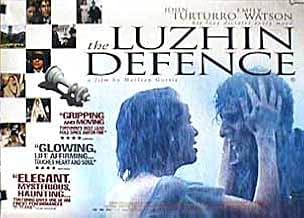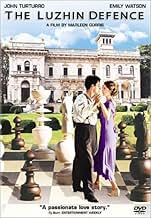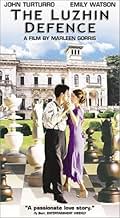NOTE IMDb
6,8/10
4,9 k
MA NOTE
Malgré la consternation de sa mère, une aristocrate tombe amoureuse d'un génie excentrique pendant les années vingt.Malgré la consternation de sa mère, une aristocrate tombe amoureuse d'un génie excentrique pendant les années vingt.Malgré la consternation de sa mère, une aristocrate tombe amoureuse d'un génie excentrique pendant les années vingt.
- Réalisation
- Scénario
- Casting principal
- Récompenses
- 3 victoires et 2 nominations au total
Avis à la une
'The Luzhin Defence' is a movie worthy of anyone's time. it is a brooding, intense film, and kept my attention the entire time. John Turturro is absolutely stunning in his portrayal of a tender, eccentric chess Grandmaster, and Emily Watson is spell-binding as the gentle but rebellious daughter of a highly respected Russian family. The chemistry between Watson and Turturro on screen is obvious from the moment their characters meet in the story. All in all, this movie is one of the best in-depth looks at the life of a chess Grandmaster, and Turturro and Watson add a whole non-mainstream, non-cliche feel to the film. Most people will come out of the theater thinking, and feeling somewhat touched by this brilliant look at the most unlikely of love stories.
'The Luzhin Defence' is a good film with fine central performances, but too much of the novel and not enough of the filmmaker's craft shines through. It felt through most of the film that the characters just helped to push the narrative along. Marlene Gorris could perhaps have examined the psyche of Luzhin, rather than depicting him as a tortured innocent victim torn apart by the cruel motives of others.
Adapting literature for the screen is clearly a difficult task, especially a novel written in the early 20th century. This film does not go deeply enough into the relationship between Luzhin and Natalia. Natalia's rift with her mother comes across a churlish disagreement by the mother rather than a dramatic flashpoint in the film. I felt that I was put through Luzhin's torment and eventual tragic end, without being given the pleasure of having his unusual and complex personality unravelled. However, this was a moving and enjoyable film but certainly not a great one.
Adapting literature for the screen is clearly a difficult task, especially a novel written in the early 20th century. This film does not go deeply enough into the relationship between Luzhin and Natalia. Natalia's rift with her mother comes across a churlish disagreement by the mother rather than a dramatic flashpoint in the film. I felt that I was put through Luzhin's torment and eventual tragic end, without being given the pleasure of having his unusual and complex personality unravelled. However, this was a moving and enjoyable film but certainly not a great one.
John Turturro, Emily Watson, Geraldine James, Stuart Wilson; directed by Marleen Gorris, loosely based on the novel by Vladimir Nabokov The Luzhin Defence is set in nineteen-twenties Italy's lake district where the world championships of Chess are being staged. Our hero Luzhin (Turturro) is a main contender for the title and recognized as one of the greatest chess minds of the era. He is utterly consumed by game, and has utterly devoted his life to the contest since a young age. It has been both obsession and addiction for the man, as it is both all he knows and what gives his life meaning. While competing in the championships, he meets Natalia (Watson), a wealthy socialite. Showing his peculiarity, he immediately asks her to marry him, sight unseen. Intrigued by his straight forward manner, she does not immediately dismiss him.
This is due to the fact that she is here for her mother to choose a suitor for her, and Luzhin's eccentricity is seen by her as a welcome change. Her mother (James) is completely taken aback by such an idea, and wants her daughter to marry someone of similar prestige and means. All of this transpires while his old chess teacher (Wilson) tutors his chief rival, wanting nothing more than to see Luzhin humiliated.
Being a chess movie, it could immediately be set aside as dull and unwatchable, being as Chess is not exactly a spectator sport.
However, this movie is much less about chess and much more about the people surrounding the game; making it a piece about the interactions of personalities and not pieces. The movie does find a parallel however, as it is shown like a chess match between two sides, the present and the past (shown through flashbacks), with one side prevailing at the end. This storytelling choice works surprisingly well, as we gain much insight as to why Luzhin is the way he is, and how he views the world.
The movie begins with a telling piece of cinematography, as the audience is given the perspective of a train conductor emerging from a tunnel. This is especially significant when viewed in the sense of Luzhin's later mental breakdown, and can be seen as meaning the same thing. This scene is then segued into the first flashback, giving us a pattern that can be seen in the rest of the film. Other notable scenes include the meeting of Natlalia and Alexander at a tennis court, and later when he is thinking to himself in their bedroom, "There is a pattern emerging!" cries the eccentric chess genius Alexander Luzhin. "I must keep track--every second!" To which Natalia, whom he loves can only reply, "It sounds like such a lonely battle.' This all encompassing effect of chess on him can also be seen earlier in the film, as he is being driven by one of his old chess teachers chauffeurs into the middle of the countryside, is dropped off there, and does not notice. The end adds character to the film without being overly dramatic, but is a departure from the finish of the novel, however it is believable and adds to the sense that Luzhin does not really control himself, or know how.
Overall an enjoying piece of film, more about camera angles and people then chess. After the first half, the films pace drastically speeds up, and the plot becomes much more intriguing. Can best be compared to other independent films of its ilk, yet also suffices quite well as a period piece. Probably not a buy, but a worthy rental for an evening at home.
This is due to the fact that she is here for her mother to choose a suitor for her, and Luzhin's eccentricity is seen by her as a welcome change. Her mother (James) is completely taken aback by such an idea, and wants her daughter to marry someone of similar prestige and means. All of this transpires while his old chess teacher (Wilson) tutors his chief rival, wanting nothing more than to see Luzhin humiliated.
Being a chess movie, it could immediately be set aside as dull and unwatchable, being as Chess is not exactly a spectator sport.
However, this movie is much less about chess and much more about the people surrounding the game; making it a piece about the interactions of personalities and not pieces. The movie does find a parallel however, as it is shown like a chess match between two sides, the present and the past (shown through flashbacks), with one side prevailing at the end. This storytelling choice works surprisingly well, as we gain much insight as to why Luzhin is the way he is, and how he views the world.
The movie begins with a telling piece of cinematography, as the audience is given the perspective of a train conductor emerging from a tunnel. This is especially significant when viewed in the sense of Luzhin's later mental breakdown, and can be seen as meaning the same thing. This scene is then segued into the first flashback, giving us a pattern that can be seen in the rest of the film. Other notable scenes include the meeting of Natlalia and Alexander at a tennis court, and later when he is thinking to himself in their bedroom, "There is a pattern emerging!" cries the eccentric chess genius Alexander Luzhin. "I must keep track--every second!" To which Natalia, whom he loves can only reply, "It sounds like such a lonely battle.' This all encompassing effect of chess on him can also be seen earlier in the film, as he is being driven by one of his old chess teachers chauffeurs into the middle of the countryside, is dropped off there, and does not notice. The end adds character to the film without being overly dramatic, but is a departure from the finish of the novel, however it is believable and adds to the sense that Luzhin does not really control himself, or know how.
Overall an enjoying piece of film, more about camera angles and people then chess. After the first half, the films pace drastically speeds up, and the plot becomes much more intriguing. Can best be compared to other independent films of its ilk, yet also suffices quite well as a period piece. Probably not a buy, but a worthy rental for an evening at home.
Albeit excellent in cinematography and actors' work, the movie stunned me by its almost complete unrelatedness to the famous (and one of the best) novel by Vladimir Nabokov. All the plot lines are put topsy-turvy, the spectacular intricacy of the plot is revealed in a straight line and all the intellectual play of Nabokov with the reader (false clues, not telling the reader the main character's first and middle name until the very last page of the novel, etc) are all gone from the film. The movie's ending is hilariously hollywoodish (and, of course, has nothing to do with the novel again). In one word, one can watch it if one hates Nabokov and has a penchant for twisted originals.
It was riveting the first time and equally so the second time. I couldn't stand to miss one word. I guess I was hooked on it. It dwarfs A Beautiful Mind; I don't know how you rated that one. The movie leaves you excited about being obsessed with anything you really love. I think it was the story that grabbed me, not whatever failings someone is guessing the film has. The beauty of loving Sasha, someone who is NOT off the yuppie assembly line. However, the good-heartedness of the yuppie (the mother's choice). The good-heartedness of Sash's opponent. The evil of only one bad apple. Its a beautiful world that must exist outside of reality. Certainly outside the borders of my country. It is what movies do...make us dream and wish it could be true.
Le saviez-vous
- AnecdotesLa défense Loujine (2000) was shot entirely in Europe. Budapest, Hungary was used for outdoor scenes as they were set in St Petersburg, these included the Széchenyi Chain Bridge, Hungarian National Museum and Heroes' Square. The chess tournament (although in Italy) was shot inside the main hall of the Museum of Ethnography, Budapest. In Italy, the hotel scenes were filmed at Villa Erba, Cernobbio, on the Lake Como. The scene at the railway station is in Brenna-Alzate, near Como.
- GaffesIn his game as white against an unnamed opponent before the final, Luzhin is shown supposedly checkmating with Rd1-d8, which is an illegal move because his rook at d1 is pinned against his king on h1 by black's rook at c1.
- Citations
Aleksandr Ivanovich Luzhin: There's a pattern emerging, a definite pattern. Not Turati. I repeat that game. I've beaten him. And his moves are repeated, repeated, repeated moves. I must keep track... of every second. Every second I must keep track of, every second.
Natalia Katkov: It sounds like such a lonely battle.
- Bandes originalesJazz Suite No. 2: VI. Waltz 2
Written by Dmitri Shostakovich (as Dimitri Shostakovich)
Performed by Koninklijk Concertgebouworkest (as Royal Concertgebouw Orchestra)
Conducted by Riccardo Chailly
By permission of Boosey & Hawkes Licensing
Courtesy of Decca Record Label Ltd.
Under license from Universal Special Markets
(p) 1992 Decca Records
Meilleurs choix
Connectez-vous pour évaluer et suivre la liste de favoris afin de recevoir des recommandations personnalisées
- How long is The Luzhin Defence?Alimenté par Alexa
Détails
- Date de sortie
- Pays d’origine
- Langues
- Aussi connu sous le nom de
- The Luzhin Defence
- Lieux de tournage
- Budapest, Hongrie(St Petersburg scenes)
- Sociétés de production
- Voir plus de crédits d'entreprise sur IMDbPro
Box-office
- Montant brut aux États-Unis et au Canada
- 1 053 070 $US
- Week-end de sortie aux États-Unis et au Canada
- 63 203 $US
- 22 avr. 2001
- Montant brut mondial
- 1 873 620 $US
- Durée1 heure 49 minutes
- Couleur
- Mixage
- Rapport de forme
- 1.85 : 1
Contribuer à cette page
Suggérer une modification ou ajouter du contenu manquant

Lacune principale
By what name was La défense Loujine (2000) officially released in India in English?
Répondre





























